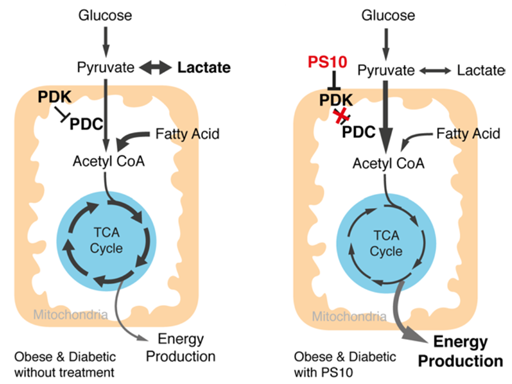A Novel Inhibitor of Pyruvate Dehydrogenase Kinase Stimulates Myocardial Carbohydrate Oxidation in Diet-Induced Obesity
Cheng-Yang Wu, Santhosh Satapati, Wenjun Gui, Richard M. Wynn, Gaurav Sharma, Mingliang Lou, Xiangbing Qi, Shawn C. Burgess, Craig Malloy, Chalermchai Khemtong, A. Dean Sherry, David Chuang*, Matthew E. Merritt*
The pyruvate dehydrogenase complex (PDC) is a key control point of energy metabolism and is subject to regulation by multiple mechanisms, including posttranslational phosphorylation by pyruvate dehydrogenase kinase (PDK). Pharmacological modulation of PDC activity could provide a new treatment for diabetic cardiomyopathy, as dysregulated substrate selection is concomitant with decreased heart function. Dichloroacetate (DCA), a classic PDK inhibitor, has been used to treat diabetic cardiomyopathy, but the lack of specificity and side effects of DCA indicate a more specific inhibitor of PDK is needed. This study was designed to determine the effects of a novel and highly selective PDK inhibitor, 2-[(2,4- dihydroxyphenyl)sulfonyl] isoindoline-4,6-diol (designated PS10), on pyruvate oxidation in dietinduced obese (DIO) mouse hearts in comparison with DCA-treated hearts. Four groups of mice were studied: lean control, diet-induced obese (DIO), DIO + DCA and DIO + PS10. Both DCA and PS10 improved glucose tolerance in the intact animal. Pyruvate metabolism was studied in perfused hearts supplied with physiological mixtures of long chain fatty acids, lactate and pyruvate. Analysis was performed using conventional 1H and 13C isotopomer methods in combination with hyperpolarized [1- 13C]pyruvate in the same hearts. PS10 and DCA both stimulated flux through PDC as measured by the appearance of hyperpolarized [13C]bicarbonate. DCA but not PS10 increased hyperpolarized [1-13C]lactate production. Total carbohydrate oxidation was reduced in DIO mouse hearts but increased by DCA and PS10, the latter doing so without increasing lactate production. The present results suggest that PS10 is a more suitable PDK inhibitor for treatment of diabetic cardiomyopathy.

